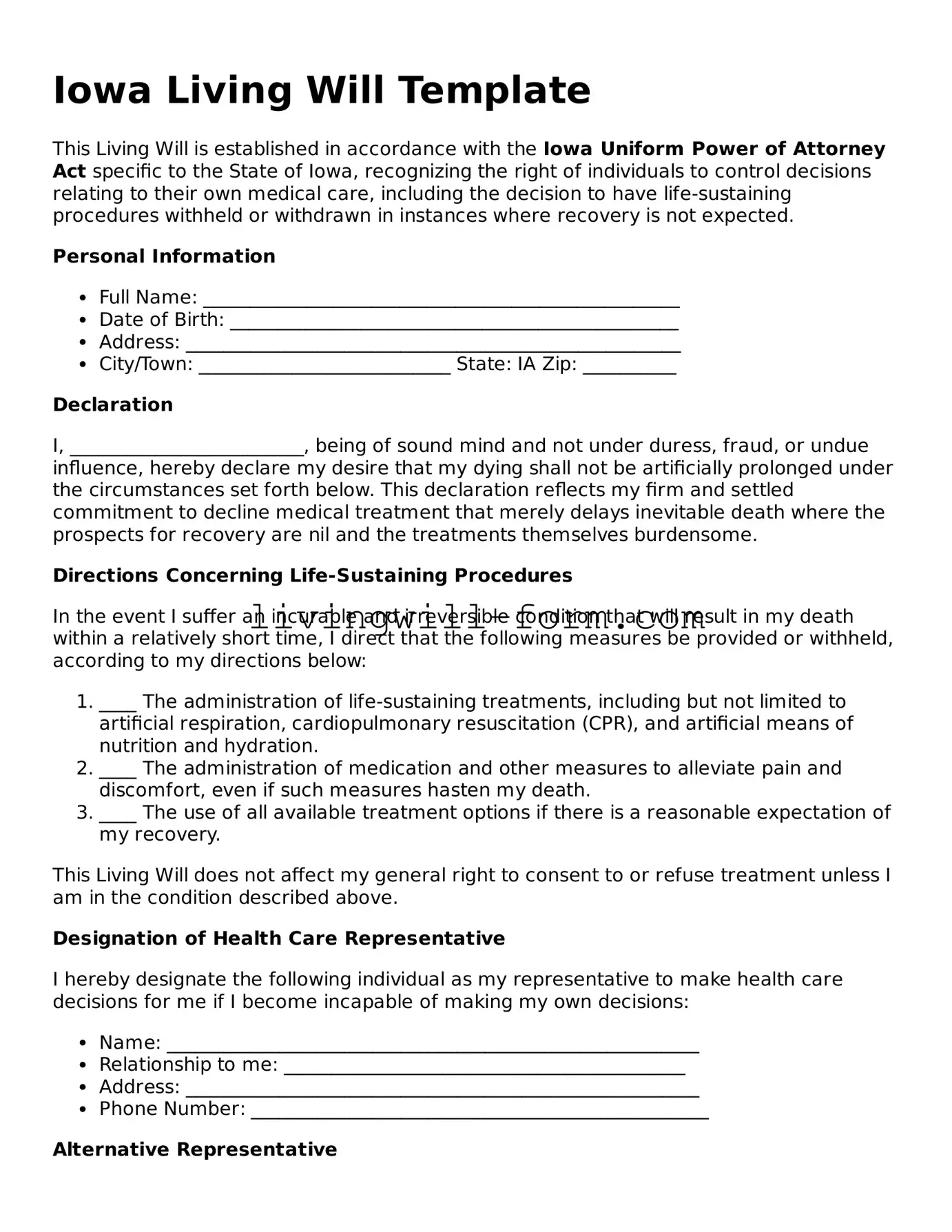What is an Iowa Living Will?
An Iowa Living Will is a legal document that allows a person to outline their preferences regarding medical treatment in the event they become unable to communicate their wishes due to illness or incapacity. It specifically addresses scenarios where terminal conditions or permanent unconsciousness are involved. This form guides healthcare providers on whether or not to administer life-sustaining treatments.
Who should have an Iowa Living Will?
Any competent adult in Iowa who wishes to have control over their medical treatment decisions should consider creating a Living Will. It's particularly important for those with strong feelings about life-sustaining measures or those with serious health conditions.
How do I create an Iowa Living Will?
To create an Iowa Living Will, you must complete a form that complies with Iowa law. The form needs to clearly state your wishes regarding life-sustaining treatment. You must sign the document in the presence of two witnesses, who also need to sign it, affirming that you are competent and acting voluntarily. Alternatively, you can have the document notarized. It is advisable to seek legal advice to ensure the form accurately reflects your wishes and meets all legal requirements.
Are there any specific requirements for the witnesses?
Yes, Iowa law has specific requirements for witnesses. Witnesses to the signing of a Living Will must be at least 18 years old. They cannot be the person creating the Living Will, related to them by blood, marriage, or adoption, entitled to any portion of the estate upon death, financially responsible for medical care, or directly involved in the provision of health care to the individual.
What should I do with my completed Iowa Living Will?
After completing your Iowa Living Will, you should provide a copy to your physician, who will include it in your medical records. It's also wise to share copies with close family members or a trusted friend, and your health care power of attorney if you have designated one. Keeping a copy in a safe but accessible place is also recommended.
Can I change or revoke my Iowa Living Will?
Yes, you can change or revoke your Iowa Living Will at any time, provided you are competent to do so. To revoke, you can either create a new Living Will that outlines different instructions, make a written declaration that you are revoking your current Living Will, or destroy the original document with the intent to revoke it. Inform your physician, family, and anyone else who has a copy that you have made changes to your wishes.
Does an Iowa Living Will cover organ donation?
An Iowa Living Will primarily focuses on decisions about life-sustaining treatment, not organ donation. If you wish to express your desires regarding organ donation, it's advisable to complete a separate document, such as a donor card or add specific instructions to a durable power of attorney for health care where you can include organ donation wishes.
Is an Iowa Living Will different from a Medical Power of Attorney?
Yes, an Iowa Living Will and a Medical Power of Attorney serve different purposes. An Iowa Living Will outlines your preferences regarding life-sustaining treatment. In contrast, a Medical Power of Attorney allows you to appoint someone to make healthcare decisions for you if you are unable to communicate your wishes. These can work together, with the Living Will guiding your attorney-in-fact in making decisions in line with your stated preferences.
What happens if I have an Iowa Living Will and I move to another state?
If you move to another state, your Iowa Living Will might still be valid, but laws vary by state. It is advisable to review the living will laws in your new state and consider updating your documents to meet the local requirements. This ensures that your healthcare wishes are respected, no matter where you reside.
Can a living will take effect if I am pregnant?
In Iowa, if you are pregnant and unable to communicate your healthcare wishes, the provisions of a Living Will may not be honored if it is determined that the fetus could develop to the point of live birth with the continuation of life-sustaining treatment. This aspect is crucial to consider when drafting a Living Will, especially for women of childbearing age.

